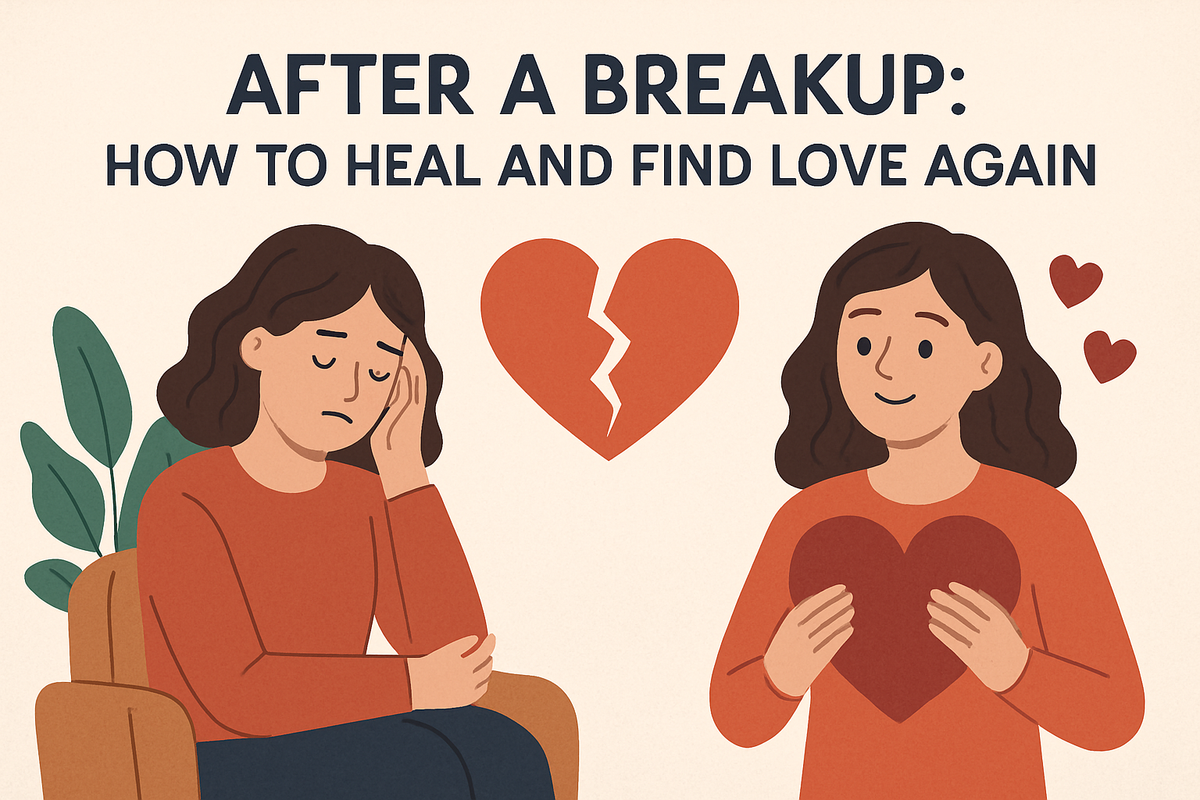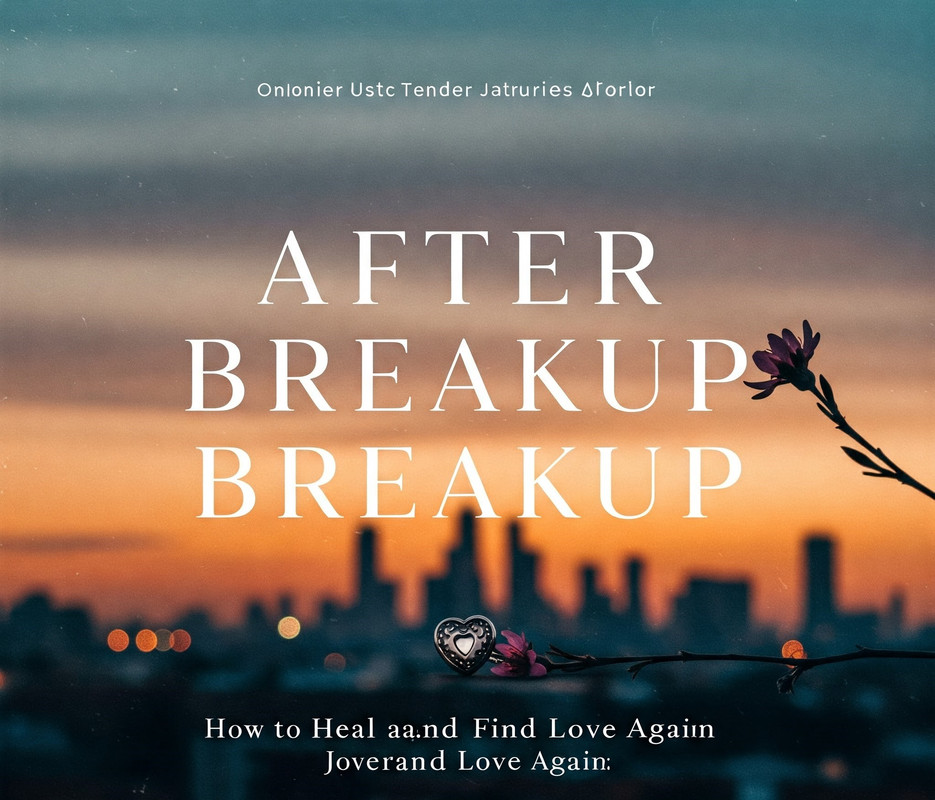After a Breakup: How to Heal and Find Love Again
Breakups can feel overwhelming, as you work through the emotional challenges that follow. One moment, you’re building a life together, the next, you may find yourself sorting through the pain, wondering if you’ll ever feel whole again.
In this guide, we'll walk through the journey from heartbreak to healing, and ultimately, to opening yourself to love again. This isn't about quick fixes or empty promises—it's about honouring your experience while building a foundation for a brighter future.
Understanding the Breakup Recovery Process
Healing from a breakup isn't linear. Some days you'll feel stronger, and others might knock you back to square one. This rollercoaster is completely normal.
The Emotional Stages of Breakup Recovery
Most people experience several emotional phases after a significant breakup:
Shock and denial: The initial phase of disbelief, where it feels hard to accept that the situation is real.
Pain and guilt: When reality sets in and intense emotions begin to surface.
Anger and bargaining: During this phase, you may find yourself blaming either your ex or yourself, or fantasizing about reconciliation.
Depression and loneliness: This is the ‘valley’ of the breakup journey, where emotions can feel overwhelming and isolating.
The upward turn: Slowly, you may begin to experience more good days than bad as healing takes place.
Reconstruction: This phase involves rebuilding your life and redefining your identity.
Acceptance and hope: Finally, you reach a place of peace, embracing new possibilities with optimism and openness.
Why Breakups Hurt So Much
Breakups don't just end relationships—they disrupt our sense of identity, security, and future plans. Research even shows that romantic rejection activates the same brain regions as physical pain, which explains why heartbreak can feel so physically overwhelming.
When a relationship ends, you're grieving multiple losses:
The person and relationship you loved
The future you had envisioned together
Parts of your routine and social circle
A piece of your identity that was connected to being "us"
Understanding this can help you be more compassionate with yourself during the healing process.
Immediate Aftercare: Getting Through the First Weeks
The early days after a breakup are often the most intense. Here's how to take care of yourself during this critical time:
Create Emotional Space
Limit contact with your ex: Consider a "no contact" period to give yourself space to heal
Manage social media exposure: Unfollow, mute, or take a break from platforms where you'll see updates about your ex
Allow yourself to grieve: Take time each day to acknowledge and feel your emotions instead of holding them in.
Build a Support System
Lean on trusted friends and family: Be specific about what kind of support you need—sometimes you may want advice, other times just a listening ear
Consider professional help: Therapists can provide valuable guidance through difficult emotional terrain
Join support groups: In-person or online communities of people going through similar experiences can reduce feelings of isolation
Take Care of Your Physical Health
Your emotional and physical wellbeing are deeply connected. Focus on:
Getting adequate sleep (even if it means using sleep meditations or white noise)
Eating nutritious foods (even when your appetite changes)
Moving your body regularly to release tension and boost endorphins
Limiting alcohol and substances that can deepen depression
The Middle Phase: Rebuilding Your Life
Once the initial shock fades, it’s time to focus on healing and rebuilding. This phase is about rediscovering who you are outside of the relationship.
Rediscover Your Identity
Revisit old interests: Take some time to reflect on the hobbies or activities you enjoyed before the relationship. Rediscovering these passions can help you reconnect with yourself.
Connect with your values: Take a moment to think about what matters most to you now, and how you want to move forward.
Process and Learn
Every relationship—even painful ones—offers valuable lessons:
Journal about the relationship: What worked? What didn't? What patterns do you notice?
Identify your needs: What was missing that you need in future relationships?
Take responsibility: Without blaming yourself, acknowledge your contribution to the relationship dynamics
This reflection isn’t about dwelling on the past; rather, it’s about gaining insights that will help guide your future.
Moving Forward: Opening to Love Again
There is no set timeline for when you should be ready to date again; healing is a personal journey. The right time is when:
You've processed the major emotions from your breakup
You're excited about the possibility of connection (not just escaping loneliness)
You can talk about your ex without intense emotional reactions
Preparing for New Connections
Before diving back into dating:
Update your relationship vision: What kind of partnership do you want now?
Identify red and green flags: Based on your experience, what signals will you pay attention to?
Set healthy boundaries: What are your non-negotiables?
Dating with an Open Heart and Clear Eyes
When you're ready to date:
Start slowly: There's no rush to find your next serious relationship
Be honest about where you are: It's okay to tell potential partners you're recently out of a relationship
Trust your instincts: Your breakup has taught you valuable lessons—listen to your inner wisdom
Balance openness with discernment: Being open to love doesn't mean ignoring concerns
Navigating Setbacks
Healing isn't linear, and you may experience setbacks along the way:
Hearing about your ex moving on: This can trigger grief even if you've made progress
Anniversary dates or shared locations: These can unexpectedly bring emotions to the surface
Dating disappointments: Early dating experiences after a breakup can be particularly sensitive
When setbacks occur:
Acknowledge the feelings without judgment
Remind yourself how far you've come
Return to self-care practices that have helped previously
Reach out for support if needed
Conclusion: Your Heart's Resilience
Heartbreak may be one of life's most painful experiences, but it also reveals our incredible capacity for resilience. Every step you take toward healing—whether it's getting through a difficult day, learning about yourself, or eventually opening to new connections—is a testament to your strength.
Remember, healing takes time, and each day brings you one step closer to feeling whole again. Some days, the most you can do is simply endure the pain and allow yourself to heal at your own pace. Other days, you'll feel glimmers of your old self returning, perhaps even stronger and wiser than before.
The end of one relationship isn't the end of love in your life. By honouring your experience, caring for yourself, and remaining open to the lessons and growth available in this difficult time, you're not just healing from a breakup—you're laying the groundwork for deeper, more fulfilling connections in the future.
Your heart knows how to heal. Trust the process, be patient with yourself, and know that love will find its way back to you when the time is right.
Disclaimer :
This article is meant for informational purposes only and is not a replacement for professional guidance. If you're experiencing uncontrollable anger or aggression, please consult with a qualified mental health professional. If you're experiencing persistent workplace anger that affects your wellbeing, consider connecting with resources at Mental Health Connect for additional support.


Comments
Post a Comment